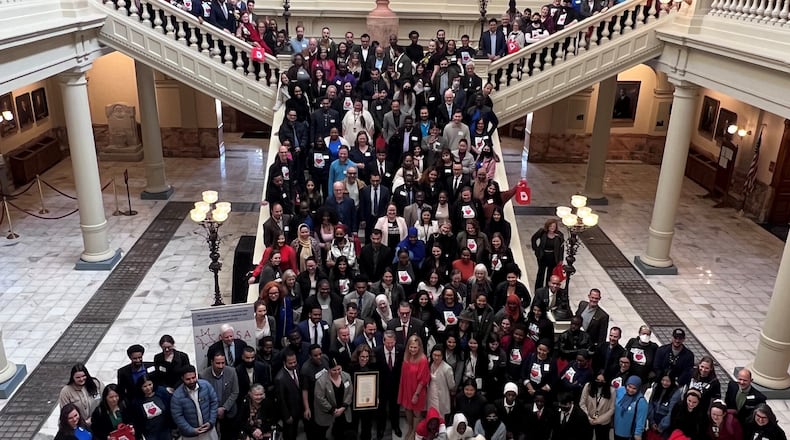Hundreds of refugees, immigrants, and immigration advocates converged at the Georgia State Capitol on Tuesday – part of an annual tradition to push for immigrant friendly policies and tout foreign-born workers’ contribution to the Georgia economy.
The visit of the Coalition of Refugee Service Agencies to the Legislature started with the acknowledgement of a bipartisan resolution passed in the Georgia House last week, which recognized February 13 as “New Americans Day” at the capitol.
State Rep. Marvin Lim (D-Norcross) and Georgia House Speaker Jon Burns, a Republican from Newington, were the first and second signers of the resolution. It trumpets the business income generated by foreign-born business owners in the state ($2.5 billion annually) and Georgia immigrants’ tax contributions ($11 billion in federal, state, and local taxes in 2021 alone).
The resolution also mentions Georgia’s long history resettling refugees, and notes that 90% of refugees are economically self-sufficient within six months of arriving to the state.
During their visit to the capitol, immigrant advocates will be voicing their support for the following policy priorities: in-state tuition access for immigrant students, reduced barriers to relicensing for immigrant healthcare professionals, expanded access to childcare, more language access for immigrant parents, and strengthened protections for tenants.
Including Ukrainians who were allowed entry to the U.S. through a humanitarian parole system, the number of refugees resettled in Georgia in fiscal year 2023 was 3,171 – the highest total in at least six years, according to the CRSA.
Refugees are individuals who flee their home country because of persecution. They are vetted by U.S. authorities before they are cleared to relocate stateside.
Last year, the refugees who were newly resettled in Georgia moved into the following counties: Barrow, Bartow, Carroll, Chatham, Cherokee, Clarke, Clayton, Cobb, DeKalb, Douglas, Forsyth, Fulton, Gordon, Gwinnett, Hall, Oconee and Polk.
The growing number of refugee admissions reflects “an important tradition that we have in Georgia and within the United States,” said Ashley Coleman, co-chair of the CRSA. “There’s been a commitment to upholding that and to work on building the infrastructure that had previously been dismantled.”
While in office, former president Donald Trump slashed the number of refugee admissions, labeling the resettlement process a security threat. President Joe Biden has moved to expand the program, but rebuilding its capacity has been challenging.
Given the election-year context – with immigration expected to emerge as a key issue for Trump and Republican campaigns – advocates like those filling the capitol today may be in for a turbulent 2024. Last month, the work of a volunteer-run nonprofit that helps immigrants recently released from detention navigate the Atlanta airport was criticized on Fox News, after a state senator went viral with false claims of trafficking.
“From a silver lining perspective, we have seen this trend where, the more and more that the communities that we serve become attacked and the more that the work that we do and our ability to do it in the future becomes threatened, the more we actually start to see increased interest in people wanting to volunteer, or wanting to donate or wanting to get involved in advocacy,” Coleman said.
“We expect our supporters to kind of respond to this type of [political] climate and pitch in.”
The Atlanta Journal-Constitution and Report for America are partnering to add more journalists to cover topics important to our community. Please help us fund this important work at ajc.com/give
About the Author
Keep Reading
The Latest
Featured

